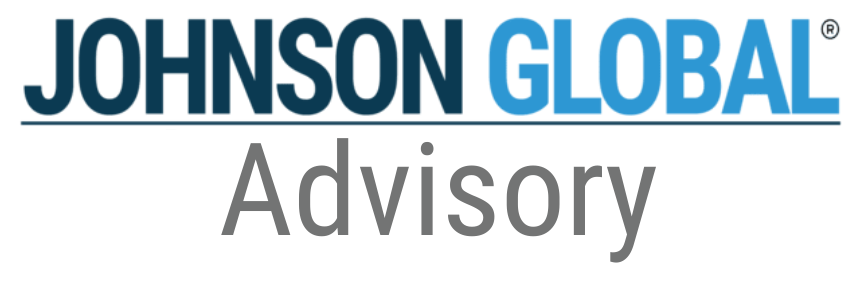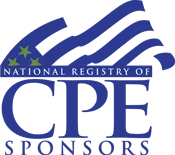PCAOB 101 – Part III: Exploring Enforcement Inquiries
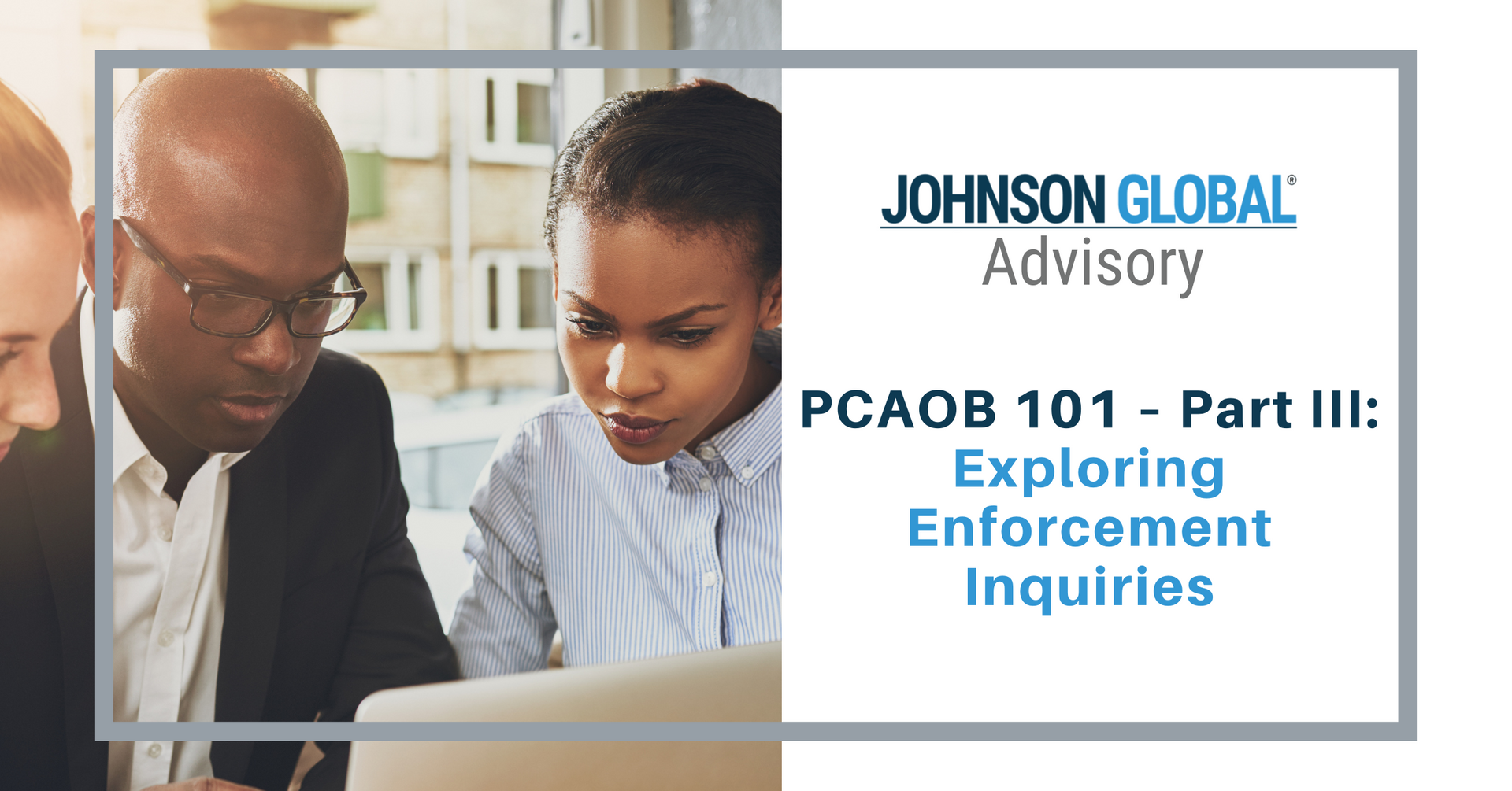
PCAOB 101 Part III: Exploring Enforcement Inquiries is the third of our three-part series on the inspection process. Please also explore Part I: Preparing for a PCAOB Inspection and Part II: Navigating Inspection Week for additional insights.
PCAOB 101 – Part III: Exploring Enforcement Inquiries
The PCAOB has multiple divisions; the largest includes the Division of Registration and Inspections (or DRI). The second largest division is the Division of Enforcement and Investigations (or DEI). While the inspection process acts as a “monitor” ensuring firms adhere to the audit standards, identifying areas for remediation and improvement, the enforcement process is more akin to the “judge and jury” enforcing compliance and deciding on various repercussions for noncompliance. In Parts I and II, we cover the inspection process. Now, in Part III, we’re going to provide an overview of the enforcement process.
Enforcement Inquiries
The enforcement division performs both informal and formal inquiries as part of its information gathering process to determine whether to pursue an enforcement action or not. Through our work supporting firms and their in-house and external counsel through enforcement proceedings, we know that the sources of tips and referrals are not specifically disclosed, but DEI does have contact information for tips and referrals online on its website; these tips could stem from anyone whether auditors, investors or the general public. We also know that there appears to be a correlation between enforcement inquiries and a) engagements with poor inspection results, b) firms with repeat/recurring inspection deficiencies (indicating a failure to sufficiently remediate) and c) SEC matters including restatements and SEC investigations. Based on the potential severity of the matter, DEI will either launch an informal or formal inquiry. DEI leadership has confirmed publicly that DEI (i.e. inspection results) are the largest source of referrals to DEI attorneys.
Informal Inquiry
Most DEI matters start as an informal inquiry whereby the firm can expect to receive an information request. Inquiries can be targeted at a firm, employees of the firm, such as the engagement partner, engagement quality reviewer or even the engagement manager, or both the firm and its employees. In addition, the investigation could be focused on a specific engagement or may focus on the firm and its system of quality control, or both.
Although the inquiry is considered “informal,” be not deceived; all communication with the PCAOB’s DEI is formal and should be considered as information that will be reviewed and potentially used in the case against the firm or its employees. In other words, when receiving a DEI inquiry, presume potential litigation and respond very carefully.
The initial communication will not specifically detail the crux of DEI’s focus, but it will make specific data requests. Through these requests, firms can begin to narrow down the potential concern(s). For instance, enforcement will often ask for audit workpapers for a specific issuer, for specific years and sometimes for narratives regarding audit procedures performed in certain audit areas. Through the power of deduction, if a firm received poor inspection results months earlier in the same focus area, one can reason that DEI is likely investigating the same or similar matter.
The inquiry process starts with data requests, typically being audit workpapers, although firms will sometimes need to provide new / additional documentation depending on the requests. As well, DEI will often request email communications. This is a legal matter, so firms need to understand the preservation requirements and should not be deleting emails or other communication after receiving a DEI inquiry.
Documents must be provided in very specific formats that include the metadata (i.e. various tags linked to data files such as dates documents were created, modified, etc.). We recommend collaborating with counsel to ensure full compliance with the data requests; there are specific service providers that can help with the document production to ensure compliance with PCAOB expectations. Document requests can be very large, so don’t underestimate the time required to comply. While firms may ask for additional time if needed, a pro-active response from the firm demonstrates cooperation.
As DEI goes through the information provided, additional questions or documents may be requested, so there can be multiple phases of back-and-forth. If the enforcement team is unable to resolve its questions through the data requests and/or if the firm/engagement team is being non-cooperative, DEI will then launch a formal investigation through an Accounting Board Demand.
Formal Investigation
Although most investigations start through informal inquiries, some may begin directly with a formal investigation. The starting point is always the same: the document request. Once documents have been reviewed, testimony of individuals relevant to the investigation is often required. While DEI consists predominantly of lawyers, they also have accountants (i.e. auditors) who assist with the investigation process. For instance, while lawyers will build the case and determine the legal ramifications, they consult with accountants who assist in the review of data and advise on the technical auditing standards and rules of the PCAOB.
Interviews start with a set list of questions though these are not communicated in advance and the enforcement team could expand as needed. Typically, the interviews are geared towards the engagement partner, the EQR, and the engagement managers for engagement deficiencies and then firm-level professionals for more quality control related matters. Again, it will always depend on the scope of the investigation, but the enforcement team will make it explicitly clear who they want to interview.
Interviews can take entire days, but there are breaks built into the process, much like the inspection process. During these breaks, we find it beneficial for the firm and its staff to debrief the questions with its legal counsel as well as any accountants and/or PCAOB consultants. Legal counsel and the expert can help interpret the nature of the queries and help the engagement team understand the potential issues and where the PCAOB is going with its questioning.
Enforcement Actions
After testimony is complete, the enforcement team will review the totality of the evidence and conclude on whether to pursue an enforcement actions, if any. The most common actions include one or a mix of the following:
- Fines of both individuals and/or of firms.
- A permanent or temporary bar of individuals from associating with a PCAOB-registered firm
- Revocation of the Firm’s PCAOB registration.
- Restrictions on activities such as prohibiting taking on new clients or limiting the types of clients a firm or individual may audit.
- Remedial actions, sometimes requiring an independent monitor to ensure appropriate execution.
As DEI evaluates enforcement actions, the investigation team will consider the cooperation of the firm and/or individuals involved in the investigation. Proactive responses, such as immediately remediating issues identified by PCAOB inspectors and investigators can also help reduce enforcement actions as it demonstrates that all parties involved take the matters seriously. Finally, transparency (read: honest and fully responsive) is paramount to the enforcement process. Whatever you do, do NOT modify audit workpapers; the PCAOB requests metadata and will drill into modifications to workpapers.
With enforcement, this is truly a case of “no news is good news.” In the absence of enforcement actions, DEI will not specifically communicate the closure of an inquiry; rather firms will simply not hear anything additional from DEI. Much like the SEC and comment letters, regulatory bodies often reserve the right to continue to pursue matters in the future should additional information come to light and thus, there is no formal conclusion communicated to the respondents.
Preparation
As we stated earlier, nothing about the enforcement process is informal; firms and individuals need to take the process seriously. Just as with inspections, first impressions matter. When a firm receives an enforcement inquiry, we recommend consulting with legal counsel immediately. And, just as DEI uses both lawyers and accountants, so too, should firms engage both legal counsel and accountants (or PCAOB consultants) to help navigate the enforcement process. Lawyers and accountants can help to:
- Interpret the data request to better understand the potential concerns and narrow down the scope as much as possible. Both legal and accounting support can also help determine the potential severity of the issue and the likelihood of advancement to further stages in the enforcement process.
- Assist with the review of deliverables to the enforcement team. Part of that review is ensuring documentation is being provided as requested with the appropriate metadata. We’ve seen firms provide data without paying attention to the detailed requests and then having to go back and provide modified data. The PCAOB is strict regarding documentation modification and now, in addition to the general inquiry, the firm is left having to demonstrate that it did not in fact modify any of the workpapers, providing even more documentation. In addition, we have helped review written memos and firm replies to specific questions, ensuring that the documentation is fully responsive to the request.
- Prepare individuals for testimony, coaching them on how to respond from a legal and technical accounting perspective, ensuring consistent communication. The key here is to be transparent in defending the work performed.
We’ve seen many firms attempt to handle informal inquiries on their own and then bring in legal counsel later in the process when the inquiry turns formal. The enforcement process can be costly, both in terms of time and money. Bringing in the right counsel early in the process can help maximize efficiency by doing it right the first time, provide complete and accurate responses and demonstrating to the PCAOB that the firm is professional and understands the potential gravity of the matter, creating a strong first impression. Of course, the best advice we can give is for firms to invest in strong quality controls and for engagement teams to apply the auditing standards and perform strong quality audits. Take the inspections process seriously and with clean inspections and quality audits, firms will likely avoid much of the hassle and the potential repercussions that come with enforcement. As with all things PCAOB, know that you don’t have to go it alone. For more information, refer to the PCAOB’s guide to proceedings and don’t hesitate to reach out to us; we’ve supported numerous firms through enforcement proceedings and know the process well.
Key Takeaways
- First impressions matter. Hire the right legal counsel and accounting experts to help navigate PCAOB enforcement inquiries.
- The first step in an inquiry is the documentation request. Be sure to provide a complete set of workpapers and documentation, adhering to the specific DEI requirements.
- For depositions, be transparent: that means being honest and fully responsive to the questions and not avoiding or trying to withhold pertinent information.
- Proactive firm and engagement team responses (and remedial actions, if relevant) and strong cooperation with the PCAOB DEI team can help reduce potential enforcement actions.




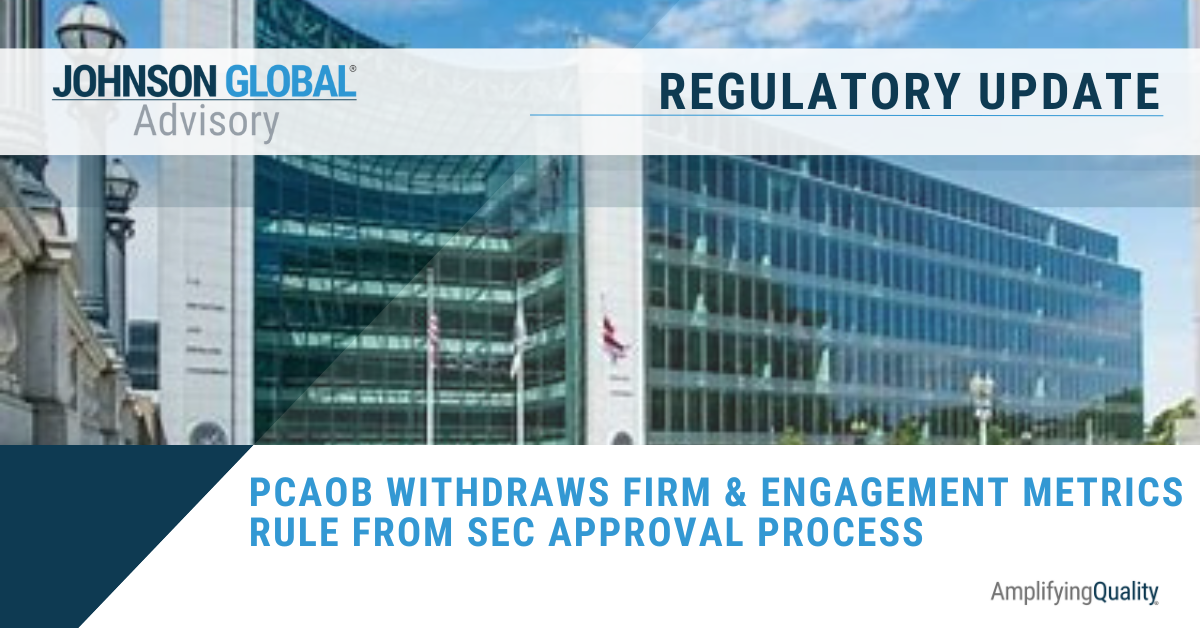
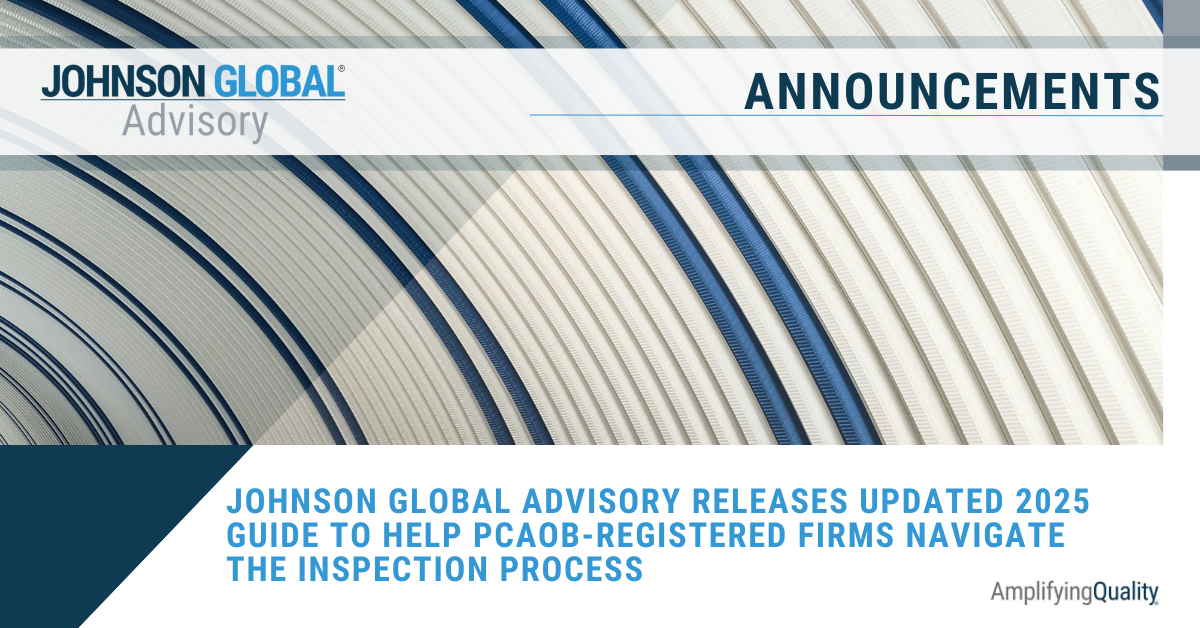

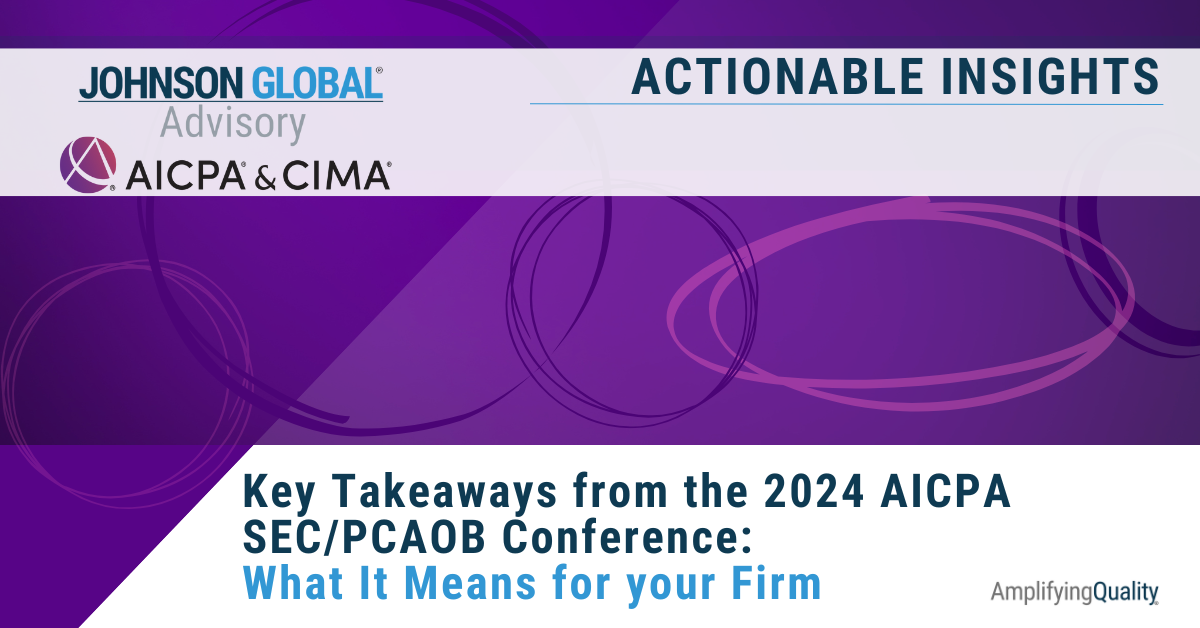
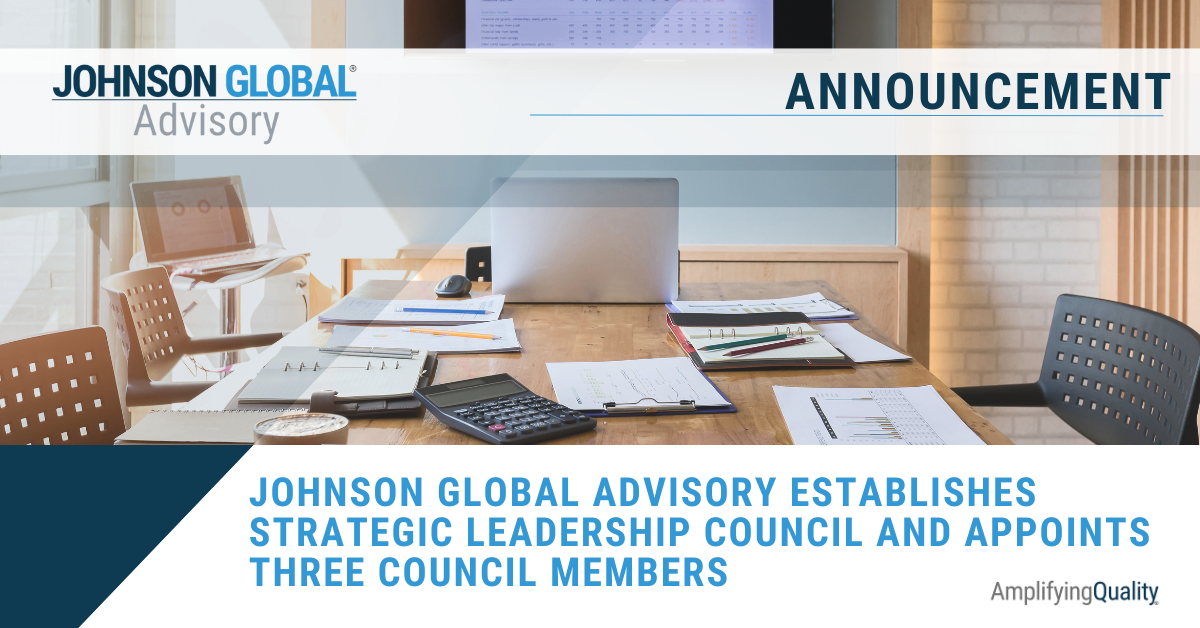

Johnson Global Advisory
1717 K Street NW, Suite 902
Washington, D.C. 20006
USA
+1 (702) 848-7084
